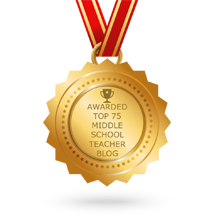I love my bookshelves, especially when they are super organized. (I just fixed up my home book shelf before I did it's photo shoot!) Here it is:
This is from IKEA and it's survived move after move. I don't think it's going to make one more though, but I love it so much I'd buy it again.
Anyways, across the top I Have some of my favorite books - I was obsessed with Nicholas Sparks and used to read everything he would release. By the 10th book, it was the same story over and over again - set in the charm of the South by water with a love story that has some kind of terrible problem. But, loved them when I was into them!
Then of course you see the Twilight books. Don't judge! Twilight was the first book I reread - I went through that series when I was doing my reading specialist certificate. Loved them...and I will always have a special place in my heart for those books!
Across the middle row I have lots of books about teaching and professional topics. I brought a few home from work that I need to revisit this summer. Then I have another favorite author, Jodi Picoult:
Some of the other books in that stack I tried but didn't finish - like Anna Karenina and Wuthering Heights - I think I need to try again. The Promise of Stardust - don't remember the plot of that one but I remember it was super good. So how is that for a recommendation? :-)
Finally, most of my collection of my critical literacy books:
When I taught eighth grade, we always had our year-long theme be "You can change the world," which came from ideas from these titles. I'm hoping this summer to work on my units for the Social Justice Projects and publish them to TpT!
Well that's what is at home, along with assorted books laying all over the house:
At work, I have two more shelves - This one (also from IKEA) houses all my professional reads:
and this one holds all the picture books that Christine and I have:
This is some $20 book case that is on it's last leg, but it holds fiction on the top and NF on the bottom. When I was in grad school that's when the major book purchasing began happening. Here are a few of my favorites to teach with:
This one is about a rat who has a lisp and gets bullied. Then one day, his lisp comes to his aid as he (unintentionally) makes his school community better. This book is adorable and great for building community in your classroom!
Chato's Kitchen is a book about a low-riding gangster cat. I love this book because I totally do voices for the cat and the mice. Pretty sure there are some other books that feature Chato, too.
I love Chewy Louie - it's a great text for an easily identified plot line. The dog chews up everything and the family goes through all these steps to help the dog stop chewing, including a singing therapist lady. Great book!
I've used Freedom Summer as part of my middle school Social Justice unit. Anyways this story is set in Mississippi in 1964 and is about two boys - one of which cannot do the same things as the other because of his race. It's a great way to open conversations about racism - in the past and current day!
So there you have it, all of my book cases! Do you feel any particular affection for yours? I'm sure you do, if you love books as much as I do!
Quick announcement: This summer on July 1st, I will be doing a PD for our district so teachers can get their own blogs going. I am going to hold a BigTime Blogging Challenge, too, with prompts for each of the days in July! I'm going to add this topic to the list, so get your ideas ready for July so you can link up with me! Of course, the purpose of blogging is to come up with your own ideas, so at any point throughout the challenge, you can always write about a different topic rather than the prompt, but just know I'll have a link-up every day of July. I hope you can join!
Have a great weekend! Only three days left of school for me (plus two of curriculum the week after!)






























































